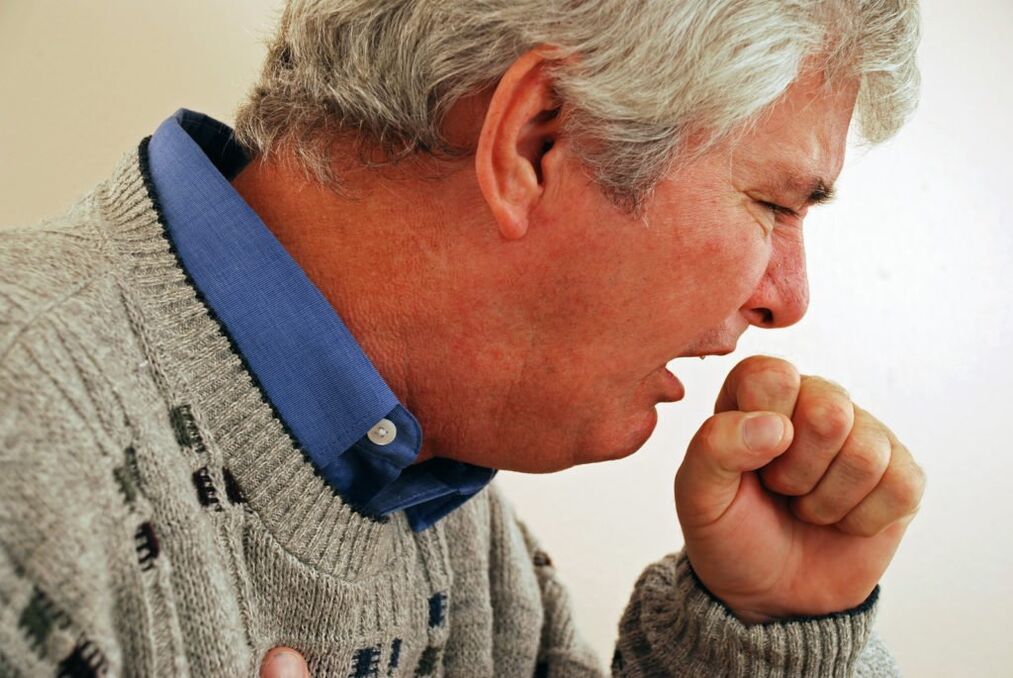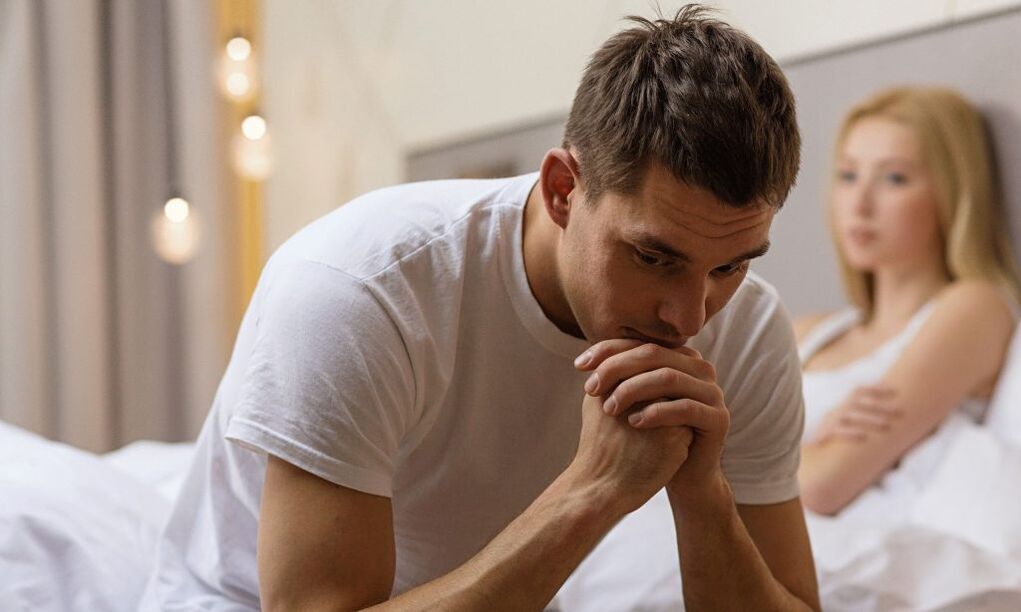Prostatitis - inflammation of the seed gland (prostate) - prostate.The disease is the most common disease of the genitourinary system in men.Most often affect patients aged 25-50 years.In accordance with various data, the prostate suffers from 30-85% of men over the age of 30.Perhaps inflammation of the testicles and supplements, which threatens infertility.The adhesion of the infection leads to inflammation of the upper parts of the genitourinary system (cystitis, pyelonephritis).

Symptoms of prostatitis
In rare cases, chronic prostatitis becomes the result of an acute process, however, as a rule, a chronic primary course is observed.The temperature occasionally rises to under -febrile values.The patient observes poor pain in the perineum, discomfort during the act of urination and defecation.The most characteristic symptom is poor discharge from the urethra during the act of defecation.The primary chronic form of the disease develops over a considerable period of time.It is preceded by prostate (blood stagnation in the capillaries), gradually turning into abacterial prostate.
Chronic prostatitis is often a complication of the inflammatory process caused by the causative agent of a specific infection (chlamydia, trichomonas, ureaplasma, gonococcus).Symptoms of a specific inflammatory process in many cases mask manifestations of prostate lesion.It is possible a slight increase in pain during urination, poor pain in the perineum, low discharge from the urethra during defecation.A slight change in clinical appearance often passes unnoticed by the patient.
Powerful, and sometimes the very threat of potential sexual disorders, is difficult to transfer to patients.Often there is a change in character, irritability, quarrel, excessive concern for their health and even "removal to illness".
If a man is suspected of the development of the prostate, then he is immediately offered to suffer differential diagnosis.This allows you to distinguish inflammation of the prostate gland from other pathological conditions that have symptoms similar to it.
Without diagnosis, the doctor will not be able to distinguish prostatitis from diseases such as urethritis, pyelonephritis, orchitis, cystitis and epididym.
Chronic prostatitis can be confused with prostate adenoma or malignant tumor in this organ.In the latter case, the patient will have significant blood loss during urination and a noticeable deterioration in the general state of health.

Typical symptoms of acute bacterial prostatitis are:
- frequent urination;
- burning during urination (usually with a small amount of urine);
- pain in the bladder and perineum area;
- pain during defecation;
- nausea, vomiting;
- Fever and chills.
Chronic bacterial prostatitis is also manifested by problems of pain and urination.However, these symptoms immediately disappear, and then appear after a while.Chronic prostatitis is characterized by a recurrent course with faded and new -mentioned inflammation.It can take many months.
In rare cases, the doctor may detect an increased amount of leukocytes in ejaculation or secretion of the prostate gland, but a sick person may not feel pain or other symptoms of prostate inflammation.
So what signs of prostate should you pay special attention?Initial manifestations of the disease:
- drawing pain in the perineum and pubic;
- discomfort during urination, after intimate contacts;
- fractures, weaknesses;
- A small increase in temperature.
Symptoms of prostatitis in men with parenchymal form:
- severe patient condition;
- At the beginning of the disease, rapid urination moves quickly to dysuria (full urine retention);
- Appetite is reduced, the patient tries thirst;
- Flatulence, inability to empty the intestines due to severe pain;
- Mucous discharge from the rectum may appear;
- Body temperature has risen, it is maintained within 39c.
One of the signs of prostate in men of this severe form is the sharp pain of the prostate gland when it tries.Examination of the patient's palpator at this stage of the inflammatory process is difficult due to a severe condition and unpleasant sensations in the genital area.If qualified treatment does not begin at this stage, then the disease can be complicated by the passage of infection into the neighboring organs, the appearance of an abscess or the development of a chronic inflammatory process.
Troubleshooting
<>A characteristic clinical appearance simplifies the process of diagnosis in acute and chronic prostatitis.Has become mandatory:
- Rectal study
- Prostate gland fence to determine the sensitivity of the microflora (planting of prostate secret and bacterial urine).
- An ultrasound of the prostate to identify structural changes (tumors, cysts, adenoma) and prostatitis differentiation from other diseases
- A spermogram to exclude or confirm the development of infertility.

To confirm the diagnosis, the doctor can also analyze the urine and take blood from the patient to examine the level of inflammatory cells.
Additional diagnostic methods for symptoms of prostate inflammation in men:
- study of prostate secret;
- Laboratory diagnostics;
- PCR research;
- Prostate ultrasound;
- Urofloometry;
- Magnetic resonance, calculated tomography of the pelvic organs.
Treatment: Basic and Non -Specific Therapy
Treatment of acute prostatitis
Patients with an uncomplicated acute process are subject to a course of treatment with an ambulance urologist.With severe intoxication, suspicion of a purulent process, hospitalization is indicated.Antibacterial therapy is performed.The drug is chosen taking into account the sensitivity of an infectious agent.Antibiotics are widely used that can penetrate well into prostate tissue (ciprofloxacin, etc.).
With the development of an acute delay in urination in the prostate FNU, they use the installation of cystostomy, and not a urethral catheter because there is a risk of forming a prostate abscess.With the development of the abscess, a transchectal or transurethral endoscopic opening of the abscess is performed.
Treatment of chronic prostatitis
Chronic prostatitis treatment should be complex, including ethotropic therapy, physiotherapy, immune correction:
- Antibiotic therapy.The patient is prescribed long-term antibacterial courses (within 4-8 weeks).Selection of the type and dosage of antibacterial drugs, as well as determining the duration of the course of treatment is performed individually.The medicine is chosen based on the sensitivity of the microflora based on the results of urine planting and prostate secret.
- Prostate massage.The gland massage has a comprehensive effect on the affected organ.During massage, the inflammatory secret accumulated in the prostate gland is squeezed into the canals, then enters the urethra and removes the body.The procedure improves blood circulation in the prostate, which allows for minimization of stagnation and ensures better penetration of antibacterial drugs into the affected organ tissue.
- Physiotherapy.To improve blood circulation, laser exposure, ultrasonic waves and electromagnetic vibrations are used.If it is impossible to perform physiotherapeutic procedures, the patient is prescribed warm medicinal microclies.
In chronic, long -term inflammation, a consultation of an immunologist is about the choice of immunocorrogative therapy tactics.The patient is given recommendations for a lifestyle change.The introduction of some changes in a patient's lifestyle with chronic prostate is both therapeutic and a preventative measure.The patient is recommended to normalize sleep and awakening, create a diet and perform moderate physical activity.
In no case should the treatment be treated at home, as it is impossible to cure acute disease with the help of traditional medicine.The chronic inflammatory process requires the intervention of experienced specialists.Modern treatment medicines allow you to relieve the inflammatory process quickly and effectively and avoid developing dangerous complications.
The following funds are used to treat prostate inflammation:
- antibacterial, antifungal, antitrichomonna drugs (depending on the cause of the development of the disease);
- antispasmodics, analgesics;
- Physiotherapeutic methods.

Therefore, urologists recommend contacting doctors as soon as the first signs of prostatitis in a man appear.This will win the time.Treatment with improvised tools at home is strictly contraindicated.
Prostate massage
Patients with chronic prostate inflammation massage the gland.This procedure should only be performed by experienced specialists, as it is a powerful treatment agent that improves the flow of purulent-inflammatory secrets from the canals.
Prostate massage refers to a complex treatment and diagnosis procedure, which should only be performed by professionals.It is performed through the rectum.The organ canals are massaged with fingers, stimulating blood circulation and the emergence of prostate secretion, whose study is required for many diseases of the genitourinary sphere.Massage releases canals from pus accumulation, relieves stagnation, reduces manifestations of infectious and inflammatory processes.
Knowing what the first signs of male prostate have, a person can detect them in a timely manner and consult a doctor.
Complications
If you do not pay attention to the signs and symptoms of prostatitis, infection is possible for other organs of the pelvic region, intense pain with urination and the appearance of blood and pus may occur in urination and pus.In a neglected form, the temperature with the prostatitis in the men rises, significantly deteriorating.
Key complications of prostatitis:
- vesiculitis (inflammation of the seed bubbles);
- Prostate sclerosis;
- prostate abscess;
- prostate cysts;
- infertility;
- powerless;
- Purulent infections of the neighboring organs.
But the most frightening complication is considered to be the hyperplasia of the gland with an increased risk of growing malignant tumors.A man often does not even know about the growth of adenoma and cancer neoplasms until they reach impressive size and has no difficulty in urinating.
In the absence of timely treatment of acute prostatitis, there is a significant risk of developing the abscess of the prostate gland.When the purulent focus is formed, the patient's body temperature rises to 39-40 ° C and can acquire a wild character.Heat periods alternate with pronounced chills.Sharp pain in the perineum complicates urination and makes it impossible to defecate.
For chronic prostate, a wave -like course with periods of prolonged remission is characteristic, during which inflammation in the prostate continues latent or manifested in extremely scarce symptoms.Patients, who do not bother, often stop treatment and become only with the development of complications.
Prostate therapy with popular remedies
Popular remedies for prostatitis serve as an alternative to medication therapy.They are used for bacterial prostatitis.Before using popular remedies, consult a doctor.
Green tea
Medicines in the form of green tea are probably the most pleasant way to treat prostatitis.It is advisable to drink 3 glasses of green tea a day.This drink contributes to frequent urination, which helps cleanse the whole body.Moreover, green tea is directly involved in detoxifying the body.
Nettle
2 punches of breeze raised nettle - about 15 cm from the top of the plant - 300 ml of drinking water should be poured and left to inject at night (approximately 12 hours).In the morning, the infusion should be a little warm and drink.
bilberry
Blueberry is one of the famous warriors against the prostate.Home treatment with blueberry involves its use in dry, fresh and canned form.In the latter case, however, the added sugar should be careful.
Blueberry juices are also available in stores.Care should also be careful here, and read the label carefully so that the juice does not contain additional juices of other fruits or artificial sweeteners.
Extremely 100% blueberry juice has healing effects.

Ginger
When treating the prostatitis, you can pay attention to another useful product - ginger root.Ginger is a promising product for treating this disease.It has a powerful anti -inflammatory effect and antioxidant properties, interrupts the reproductive cycle of cancer cells (which is particularly important in the treatment of prostate cancer), and promotes apoptosis.Along with this, ginger is not toxic to other fast -growing cells.
It should be taken after eating, adding root to tea (preferably green).
chestnut
The breasts are also effective, have no side effects, which is very important for the elderly.The bark should be removed from the chestnuts, and the essence itself should be pressed into small pieces, pour boiling water and leave an hour to create.The crawling should be taken 3 times daily before meals, 30 points.
Regular sex
Regular sex, similarly, such as masturbation, cleanses the prostate, promotes blood circulation and prevents local inflammation.




































